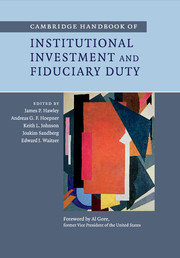Book contents
- Frontmatter
- Contents
- List of figures
- List of tables
- List of contributors
- Foreword
- 1 Introduction
- Part I Fiduciary duty: a global outlook
- Part II Fiduciary duty and the landscape of institutional investment
- Part III Challenging conventional wisdom on fiduciary duty
- Part IV Towards a broader interpretation of fiduciary duty
- Part V Beneficiaries’ roles and viewpoints
- Part VI Fiduciary duty and governance
- 30 Investors and global governance frameworks: broadening the multi-stakeholder paradigm
- 31 Promoting corporate sustainability through integrated reporting: the role of investment fiduciaries and the responsibilities of the corporate board
- 32 Reporting and standards: tools for stewardship
- 33 US corporate governance, fiduciary success and stable economic growth
- 34 Fulfilling fiduciary duties in an imperfect world – governance recommendations from the Stanford Institutional Investor Forum
- 35 Addressing the participation gap in institutional investment: an assessment framework and preliminary results
- 36 The costs of fiduciary failure – and an agenda for remedy
- Index
- References
31 - Promoting corporate sustainability through integrated reporting: the role of investment fiduciaries and the responsibilities of the corporate board
Published online by Cambridge University Press: 05 April 2014
- Frontmatter
- Contents
- List of figures
- List of tables
- List of contributors
- Foreword
- 1 Introduction
- Part I Fiduciary duty: a global outlook
- Part II Fiduciary duty and the landscape of institutional investment
- Part III Challenging conventional wisdom on fiduciary duty
- Part IV Towards a broader interpretation of fiduciary duty
- Part V Beneficiaries’ roles and viewpoints
- Part VI Fiduciary duty and governance
- 30 Investors and global governance frameworks: broadening the multi-stakeholder paradigm
- 31 Promoting corporate sustainability through integrated reporting: the role of investment fiduciaries and the responsibilities of the corporate board
- 32 Reporting and standards: tools for stewardship
- 33 US corporate governance, fiduciary success and stable economic growth
- 34 Fulfilling fiduciary duties in an imperfect world – governance recommendations from the Stanford Institutional Investor Forum
- 35 Addressing the participation gap in institutional investment: an assessment framework and preliminary results
- 36 The costs of fiduciary failure – and an agenda for remedy
- Index
- References
Summary
Introduction
While fiduciaries have various roles, they share a common obligation to act with care and loyalty to the beneficiary whose interests they serve. Fiduciaries that have control over a beneficiary’s financial assets are generally held to the strictest standards of care and loyalty. The question then arises, “How can a fiduciary entrusted with someone else’s assets make investment decisions that favor companies that promote sustainability over those that do not?” Unless the trust indenture explicitly directs the fiduciary to privilege sustainability, this conundrum has no definitive answer. However, we believe that by evaluating the activities and comparative due diligence of corporate boards, which are themselves fiduciaries, investment fiduciaries will gain valuable insights that enrich their own decision-making about companies committed to sustainable business practices.
Our argument has three legs to it. First, as discussed in the third section, corporations themselves have a broader mandate than is commonly recognized to serve various stakeholders in addition to shareholders. It is the role of the corporate board to reconcile the trade-offs implicit in this broader mandate and integrated reporting, discussed in the fourth section, is a key mechanism enabling them to do so. Second, as discussed in the fifth section, while fiduciaries may be held to a stricter standard, boards of directors must honor long-established duty of care and loyalty obligations to act in the best interests of the corporation itself. Third, the investment fiduciary typically acts on behalf of diverse investors with a range of investment horizons, risk preferences and strategic objectives. That fact establishes some investment flexibility as long as the fiduciary is acting with demonstrable prudence when making decisions. In the sixth section we argue that when investing in companies that emphasize “sustainability” as integral to their business strategy, investment fiduciaries can rely on two underappreciated factors to support their decision-making. The first is to recognize that public companies have a broader legal mandate than to narrowly maximize shareholder wealth. The second is to establish that a corporate board is well informed and diligently acting in the best long-term interests of the company.
- Type
- Chapter
- Information
- Publisher: Cambridge University PressPrint publication year: 2014
References
- 1
- Cited by



